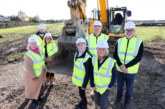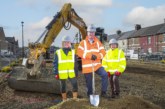
Bev Hurley, Chair of the Institute of Economic Development, the UK’s leading professional body representing economic development and regeneration practitioners, discusses the importance of social value in the construction industry.
Construction is a strategically important sector to the UK economy, accounting for 7% of the labour market and expected to create 179,000 new jobs by 2022. It is also under the spotlight given the critical role it will play in the Industrial Strategy, and via the Construction Sector Deal, a partnership between the industry and government that aims to transform the sector’s productivity through innovative technologies and a more highly skilled workforce.
The sector’s predicted spend of £500bn by 2025 underlines its contribution, however, whilst the financial and economic growth of construction is important, so too is social value. Together with Arup, Atkins, Joseph Rowntree Foundation, Commonplace, Construction Industry Training Board and Civil Engineering Contractors’ Association North West, we are embarking on new research which will shed light on progress within the industry since the formation of the Social Value Act in 2013.
The Act encourages contractors delivering works for public sector authorities to deliver a range of additional outcomes as part of their contract which benefit society. In turn, this secures the best value from the public money being spent and contributes to more inclusive growth, a vital goal for the UK economy. Social value themes include promoting skills and employment; supporting the growth of responsible businesses; creating healthier, safer, more resilient communities; protecting and improving the environment; and promoting social innovation.
Through our research, we are gathering insight on what social value (or related terminology such as social return, social responsibility and triple bottom line) is being delivered by construction and related businesses, and uncover the challenges to improving social value outcomes. Our aim is to showcase examples of really effective inclusive growth in action, and share this knowledge with those devising, procuring and executing strategies. It will create a benchmarking analysis of performance across the sector and suggest key performance indicators which can be captured and analysed to understand changes in performance.
Information gathering
Three surveys – for Tier 1 and 2 companies; for Tier 3 and 4 suppliers including SMEs; and for Institute of Economic Development (IED) members/other public sector to gather perspective of the ‘buyers’ (individuals working in regeneration and economic development, planning and procurement) – ran until the end of April.
Our members need to know where best practice examples exist within other public sector deals, which construction or infrastructure provider is going above and beyond, and who is using the Social Value portal (http://socialvalueportal.com/) or other mechanism to measure and increase their inclusive impact. They also need to know who is going beyond lip service in ensuring they and their lower tier supply chains are doing everything possible to make local businesses ‘fit to supply’ and, as a result, create real, sustainable jobs and apprenticeships.
The research is focusing on the supply side, engaging as many firms as possible to survey their practices, benchmark their social value performance, understand their challenges and highlight those who are setting the best possible inclusive growth standards. We are also approaching public sector bodies to see who has moved beyond the old rule of thumb that when procuring £1m of build, you seek one apprenticeship. Bringing together examples from both supply and demand sides, sharing what has worked well – as well as what has not worked – is critical to driving up performance across the UK and ensure that this vital sector for the economy delivers on inclusive growth.
Our final report will be launched at a special conference in the autumn, planned to coincide with a meeting of the new All-Party Parliamentary Group for Economic Development. This research will allow for policy-makers and commissioners to ensure their approach is fair, consistent and enables demonstration of strong social value, and help industry to create economies of scale through standardising approaches to creating social value and being able to align to public sector contract requirements.









